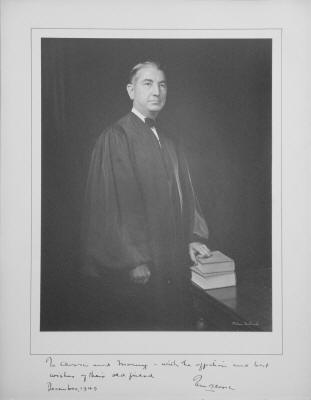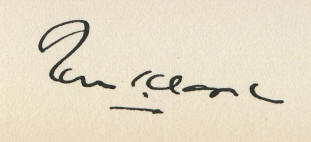708802
Tom C. Clark
Click on image for larger size
Tom Campbell Clark, 1899-1977. Attorney General, 1945-1949; Associate Justice, United States Supreme Court, 1949-1967. Magnificent 14" x 18" formal portrait, boldly inscribed and signed To Clark and Marny - with the affection and best wishes of their old friend / Tom C. Clark / December 1949.
This is absolutely the most stunning Supreme Court portrait that we have ever owned or ever seen. This is an original formal portrait photograph by Fabian Bachrach, whose gold foil stamp appears in the lower right corner of the image. We love Bachrach's work, and this is a wonderful example of it. Unfortunately it is far too big to scan in one piece, and our digital photograph makes it look gray when it is actually very sharp black and white, with a very white mount. So we have included a scan of the signature, which accurately shows the color of the piece, for comparison.
This portrait also has an exceptional association. Clark has inscribed and signed it to one of President Harry S. Truman's principal and most influential aides, Clark Clifford, and his wife, Marny. Clifford was instrumental in devising the strategy for Truman's upset victory over New York Governor Thomas Dewey in 1948.
Clark, a Texan, left private law practice to join the Justice Department in 1937. He was the civilian coordinator for the forced relocation of Japanese-Americans during the early stages of World War II, and later he headed the Justice Department's anti-trust and criminal divisions. President Harry S. Truman appointed him Attorney General in 1945, a post that he held for just over four years before Truman appointed him to the Supreme Court in August 1949.
As a Justice, Clark provided key votes in decisions expanding the scope of individual rights. For example, he joined the unanimous Court in striking down racial segregation in schools in Brown v. Board of Education. He also wrote the Court's opinion in Mapp v. Ohio, which applied to the states the Fourth Amendment exclusionary rule barring admission of illegally seized evidence in a criminal prosecution, and in three 1964 cases that upheld the public accommodations provisions of the Civil Rights Act of 1964—Heart of Atlanta Motel, Inc. v. United States, Hamm v. City of Rock Hill, and Katzenbach v. McClung.
Clark resigned from the Supreme Court in 1967 to avoid a conflict of interest when President Lyndon B. Johnson appointed his son, Ramsey Clark, Attorney General. Clark said that swearing in his son was his most "momentous" moment on the Court. After his resignation, Clark sat as a visiting justice in the United States Courts of Appeals and served as director of the Federal Judicial Center and as chair of the Board of Directors of the American Judicature Society.
Clark has boldly inscribed and signed this photograph in jet black fountain pen. There is some slight chipping at the bottom edge of the mount that would be lost in framing. Overall this piece is exceptional.
Unframed.
_____________
This item has been sold, but
click here to see other
Supreme Court items
that we are offering.
|





